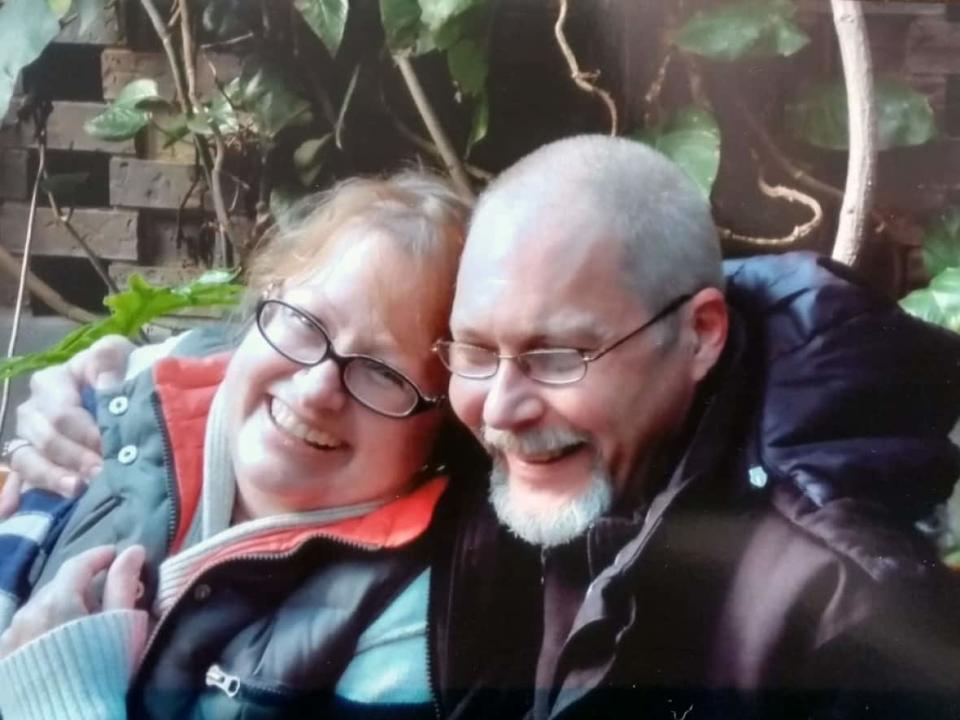Home-care workers cite a litany of systemic failures in letter to Winnipeg widower denied palliative care

A group of Manitoba home-care workers say they are haunted by delays that kept a Winnipeg woman from receiving palliative care services in her home before she died, saying it's not the first time this has happened.
On Saturday, 62-year-old Katherine Ellis died after opting for at-home palliative care last month following a diagnosis of Stage 4 pancreatic cancer in November.
Her common-law partner, Eric De Schepper, said in the time between Ellis coming home in mid-January and her death, he was left to care for her without the home care that was promised when they left the hospital.
De Schepper received a letter on Thursday penned by a group of concerned home-care workers afraid for the future of their profession.
"Thank you for going public, because we cannot," the letter said.
"Please know that you are not alone and that this is not an isolated case. Many of us have encountered this situation and are haunted by the faces of grieving families who were left with the responsibility of telling us they no longer need our services."

De Schepper said he filed a complaint with the Manitoba Ombudsman after Ellis's death, and named the Winnipeg Regional Health Authority in the disclosure of wrongdoing form.
He said his partner of a decade was left lying on the same bedsheets for weeks without more than a sponge bath because De Schepper couldn't help her out of bed on his own.
Each time he asked his palliative care co-ordinator for home care, he was told they didn't have the resources to send workers, De Schepper said.
"This is an outrage. People have to say something about this. If this letter is true, this is unacceptable. This is dehumanizing. This is disrespectful. This is wrongdoing. And that's another reason why I filed [a complaint]," De Schepper said in an interview on Thursday.
One of the Winnipeg-based home-care workers who wrote the letter said scheduling concerns and labour issues raised by health-care aides and home care workers aren't being taken seriously, and it's hurting their patients the most.
The worker, whom CBC isn't naming as she fears repercussions in her career, says she has a colleague who had a five-hour stretch where she had to sit in her office without any work to do.
"This was during the exact time period where Eric and his wife were going without home care. It's almost criminal."

The health-care aide said when she has a cancellation, she's often left waiting with nothing to do because her schedule isn't promptly filled with another home visit.
"There should be no down time," she said.
CBC News requested a comment from the Winnipeg Regional Health Authority on Thursday night in light of the letter, but didn't immediately receive a response.
Last week, a spokesperson said efforts are being made to review schedules to optimize and enhance efficiencies, while also using contract services and offering additional hours and overtime to help supplement staffing levels as needed.
The home-care worker added that she's seen cases where next of kin aren't notified when their loved ones aren't getting home care one day.
"It's a recipe for disaster. They should be phoning the contact or the client, and often they're doing neither," she said.
The home-care worker says she and others have tried to affect change to improve working conditions and care for patients, but they're looked down upon.
"I have almost exhausted every single avenue, and it's met with dismissal because we are merely health-care aides. They disrespect us, they dismiss our concerns," she said.
De Schepper says this shouldn't be happening.
"I find it heartbreaking that these people have to deal with this. It seems to me that it's disrespectful in so many ways. I have no words to express my my outrage."

